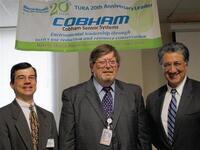Cobham Sensor Systems
March 31, 2010
Cobham Sensor Systems Recognized for Environmental Leadership
Lead-free production is one of many steps toward green design and manufacturing at Lowell electronics firm
LOWELL, Mass. – Along the way to becoming a lead-free electronics manufacturing site, Cobham Sensor Systems has also secured its place as an environmental leader in Massachusetts.
Today, the Toxics Use Reduction Act (TURA) Program and State Senator Steven Panagiotakos (D) will recognize Cobham at its Microwave Business Unit in Lowell, an employer of 400 people, as a “TURA 20th Anniversary Leader.”
The TURA Program has selected seventeen companies for the award that includes a recognition ceremony and facility tour to showcase environmental accomplishments—use of safer materials, waste reductions and energy savings—since the Toxics Use Reduction Act was enacted into law by the Massachusetts legislature in 1989.
“We selected Cobham for its environmental achievements and the open and collaborative approach they embraced to help other companies to do the same,” said Greg Morose, Industry Research Program Manager for the Toxics Use Reduction Institute at UMass Lowell. “From leadership within the New England Lead-Free Consortium to its work to reduce other toxics and conserve resources, Cobham has shared strategies, assets and expertise with other Massachusetts companies as well as with the electronics supply chain.”
From 2002 to 2004, Cobham reduced lead consumption by 84 percent, transitioning to lead-free electronics manufacturing with usage levels below reporting thresholds every year since 2004. Actively involved in the New England Lead-Free Consortium, Cobham hosted meetings and provided equipment, services and technical expertise to advance research into environmentally sound alternatives.
“Protecting the health of our employees and the environment has always been a priority for us,” said Bob Canedo, Manager, Safety, Health and Environment at Cobham Sensor Systems. “In fact, as a leading technology provider to the defense industry, building trust and protecting lives is part of our DNA. Our commitment to the individual communities in which we work is one of the reasons we’re successful as global organization,” Canedo added.
Cobham has also worked to reduce the use of hexavalent chromium
Cobham has also worked to reduce the use of hexavalent chromium, leading efforts to assess the safety and effectiveness of trivalent chromium plating as an alternative. Used as a corrosion inhibitor and primer, hexavalent chromium is a carcinogen that can damage the kidneys and liver. For these efforts too, Cobham shared its experiences with other Massachusetts companies.
The Toxics Use Reduction Act was expanded in 2006 to include conserving water and energy use—and Cobham is working on improvements in these areas as well as in recycling paper, cardboard and batteries. A facility-wide initiative is underway to reduce energy use simply by shutting down select equipment during off hours. Waste water is being tested to see if treatment remains necessary and employee education is in full gear to engage everyone in recycling.
The Toxics Use Reduction Act does not ban chemical use but requires companies to evaluate toxic chemical use, submit usage reports and plans to the state. The plan assesses the financial implications of switching to safer alternatives or making changes in production. Since 1989, Massachusetts companies voluntarily reduced toxic chemical use by 41 percent, waste by 71 percent and on-site releases by 91 percent.
About Cobham
Cobham’s products and services have been at the heart of sophisticated military and civil systems for more than 75 years, keeping people safe, improving communications, and enhancing the capability of land, sea, air and space platforms. The Company has four divisions employing more than 12,000 people on five continents, with customers and partners in over 100 countries and annual revenue of some £1.9bn / $3 billion.
Cobham Sensor Systems – a strategic business unit with Cobham’s Defense Systems
Division – designs and manufactures all classes of active and passive microwave
components, assemblies and subsystems, composites and radomes for the aerospace
and defense industries, and is the leading supplier of many microwave products.
About the Toxics Use Reduction Act Program
Twenty years ago, the Massachusetts legislature passed landmark legislation—the Toxics Use Reduction Act (TURA). Today, the TURA Program is considered a model environmental policy by other states and countries. The three agencies below have provided training, grants, technical assistance and support to help companies reduce toxic chemical use and costs, improve health and safety and establish new green markets.
- Toxics Use Reduction Institute (TURI) at the University of Massachusetts Lowell. Provides education, training, and grants for Massachusetts industry and communities; sponsors research and demonstration sites on safer materials and technologies; provides policy analysis; and manages the TURA Science Advisory Board.
- Office of Technical Assistance & Technology (OTA). A non-regulatory agency within the Executive Office of Energy and Environmental Affairs that provides free, confidential, on-site technical and compliance consultations to Massachusetts businesses and institutions.
- Massachusetts Department of Environmental Protection (MassDEP). Certifies Toxics Use Reduction (TUR) Planners, receives and reviews toxics use reports submitted by companies, provides guidance, takes enforcement actions, and collects chemical use data and makes it available to the public.
